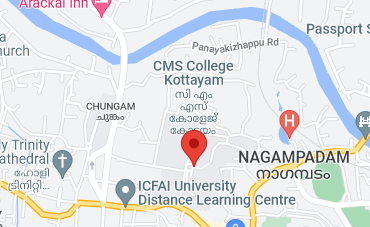Dr.Samkutty George
Education
- B.Com. University of Kerala (1979)
- M.Com. University of Kerala (1981)
- M.Phil Madurai Kamaraj University (1996)
- Ph.D. University of Kerala (2003)
Area of Specialization
- Finance
- Banking
- Capital Market
Project summary of A Critical Evaluation of the Foreign Institutional Investment in the Indian Stock Market and Its Impact on the Volatility of Market Index (Funded by: UGC Reference No.F. MRP (H)-0524/12-13/KLMG002/UGC-SWRO Dated 29th March 2013)
The Foreign Institutional Investors (FIIs) have emerged as important players in the Indian equity market in the recent past. The Indian stock market is touching new highs and there is a notion that there is a positive correlation between FII investment and the stock market Index. During the fifteen-year period from 2000, FIIs invested Rs. 749857.8 crores in the Indian equity market and Rs. 281831.2 crores in the debt market. During the review period from 1st April 2009 to 31st March 2014, FIIs made a gross purchase of Rs. 37,97,337.70 and gross sales of Rs. 32,84,745.60 resulting in a net purchase of Rs. 5,18,797.40 crores in the Indian equity market in 1235 trading days. The present study is an attempt to evaluate whether FII investment causes market fluctuations.
A detailed analysis was done to assess whether the FII investment has influenced the Sensex and the resultant changes thereof if any, on the same day and on a succeeding day. For this, net investment or withdrawal by the FIIs above Rs. 1000 crores intraday and its impact was assessed. There were 1235 trading days during the review period.
The objectives of the study are as follows:
- To analyze the amount of money invested by the Foreign Institutional Investors in India during the review period.
- To study the scope and trading mechanism of Foreign Institutional investors in India.
- To analyze whether the volatility in the Indian stock market is exclusively dependent on the purchase and sales activity done by FIIs.
- To analyse the intraday net investment above Rs. 1000 crores and its impact on Sensex
For the purpose of analysis, the following hypothesis was formulated.
- HO: The volatility in the Indian stock market is not fully dependent on the FII activity (r=0)
- H1: The volatility in the Indian stock market is fully dependent on the FII activity (r=0)
Major Findings of the study
From the above analysis, it may be concluded that the index movements are not directly correlated to the FII investment. There is unidirectional causality from Sensex to FII which means that FII does not cause fluctuations in Sensex movements. But Sensex movements cause FII to fluctuate and hence the first hypothesis that the volatility in the Indian stock market is not fully dependent on the FII activity is to be accepted.
The long-run relationship between FII and Sensex cannot be determined precisely as the ARDL model suggests an inconclusive result for cointegration.
It is evident that the index movements are not directly correlated to the FII investment. A number of factors may influence the market; these may be economic factors, political factors, or even social factors. The positive or negative news relating to the above factors may influence the price of stocks and will ultimately be reflected in the stock market index.
Likewise, Sensex is the index composed of 30 stocks from 12 different sectors of the Indian industry. More than 6000 shares were listed on the Bombay stock exchange. FII investment need not be in the component stocks of Sensex and if their investment is in other stocks it may not affect directly in the Sensex or may affect only partially to the Sensex.
The movement in the Indian capital market is not fully dependent on the investment or withdrawal of money by the Foreign Institutional Investors, an investor has to consider other factors which influence the market before investing.
Lists of Courses offered with course code
- CM1923302 – Security analysis & Portfolio Management
- CM1922110 – Research Methodology
- CM1813109 – Financial Market & Operation
- CM1814302 – Financial Services
- EC1815403 – Business Economics
Presentation of Papers
International Seminars
- Participated and presented a paper ‘Impact of Liberalization on the lending Portfolio of Financial Institution in the Housing Finance Sector’ in three day International conference held at Chaitanya Pastoral Centre, Kottayam from 9th –11th June, 2003.
- Participated and presented paper in the International Seminar on Changing scenario of Internal Trade Regime and Developing Countries at VimalaCollege Thrissur from 12-14 January 2006.
- Participated and presented paper ‘Investment Strategies in Capital Market’ in the two-day international seminar on ‘Recent Trends in Capital Market and Financial Innovations’ Organized by Bharathidasan University Tiruchirapally, on January 10-11 2009.
- Participated and presented paper ‘ Stock Market Volatility: A Study on the Role of FIIs in the Indian Stock Market’ in the two-day international seminar on ‘Recent Trends in Capital Market and Financial Innovations Organized by BharathidasanUniversity on January 2010
- Participated and presented paper ‘Micro Finance Information Exchange’ in the three-day international seminar on ICOMFI organized by the Dept of Commerce School of Management, PondicherryUniversity on 22nd -24th January 2010.
- Participated and presented paper entitled Market Reaction: A Study on FII Investment and short-run Movement of Sensex at the International Conference on Innovations in Business and Finance on 23rd and 24th May 2014 organized by the Commerce Association of Kerala
National Seminars
- Participated and presented a paper in the national seminar on Union Budget 2002, organised by the COINPAR on 9th February 2002 at Hotel Pankaj, Thiruvananthapuram-
- Participated and presented paper ‘Liberalization in Housing Sector Financing’ in the two-day National seminar on Commerce, organised by the Commerce Dept. of St.Thomas College and M.GUniversity Kottayam, at Palai, on 14th and 15th February 2003.
- Participated and presented paper ‘Sustainable Development through Self Help Groups’ in the three day National Seminar ‘All India Commerce Congress-2004 at the Chaitanya Pastoral Centre Kottayam from 4th-6th March 2004.
- Participated and Presented paper ‘Reduction in Lending Rates and its Impact with Special Reference to Housing Finance Sector’ in two-day National Seminar on Emerging Trends in the Banking and Insurance Sectors Organised by Mahatma Gandhi University, Kottayam and St. Thomas College Palai from 18-10-04 to 19-10-04.
- Participated and Presented Paper ‘ Depositories’ in the UGC Sponsored three day National Seminar on Structural Changes in the Indian Capital Market in the Liberalised Economic Environment conducted at the Nirmala College Muvattupuzha from 28th October to 30th October 2004.
- Participated and presented paper ‘ Impact of Reduction in Lending Rates’ in the in the two day National Seminar on Financial Markets in India Challenges and Opportunities sponsored by Government of Kerala at PG Dept of Commerce, Govt. College Manimalakunnu on 27-28 January 2005.
- Participated and Presented paper ‘ IT in Commerce Education’ in National Seminar on New Curriculum and Instructional Design in Commerce at St. Thomas College Kozhencherry.
- Participated and Presented Paper in UGC sponsored National Conference on Emerging Trends in Business and Finance at Nirmala College Muvattupuzha from 16-17th March 06.
- Participated and presented paper ‘Commodity Futures- Boon or Bane’ in UGC sponsored National seminar on Use of Derivatives to control price fluctuations at C M S college Kottayam on 27th and 28th March 2007
- Participated and presented paper “ Housing Cooperatives in Kerala Need Refurbishment” in National Technology Seminar, conducted by CUSAT on 9th June, 2008.
- Participated and presented paper ‘Investment Strategies in Capital Market’ in UGC sponsored National Seminar on Indian Capital Market: Challenges and Opportunities at St.Dominics College Kanjirapally on 14th and 15th October 2008
- Participated and presented paper Retail Lending of Banks- A shift from Traditional Lending in two-day National Banking Seminar by CUSAT on 23&24th March 2009
- Participated and Presented paper ‘Low-cost Housing for Sustainable Development: The Kerala Experience’ in the National Seminar on Eco-Friendly Housing for Sustainable Development in India: A Techno- Economic Perspective by CUSAT on 5th June 2009.
- Participated and presented paper ‘Green Energy: Need of the Hour’ in the National Techno-Economic Seminar organized by CUSAT, on 16th September 2009.
- Participated and presented paper ‘Stock Market Volatility – Indian Experience’ in UGC sponsored National Seminar on Recent Trends in Financial Markets at BAM College Thuruthicad on 2nd and 3rd September 2010
- Served as Resource Person in the two day state level workshop on Methodology and Perspectives of Business Studies Sponsored by Kerala State Higher Education Council held on 25 & 26 November 2010 at Deva Matha College Kuravilangad.
- Presented paper on UGC Sponsored National Seminar on Recent Trends in Capital Market and Derivatives organized by PG Dept of Commerce NSS Hindu College Changanacherry, on 30th September 2015 and 1st October 2015. Title of the paper – ‘Driving Role of FIIs in the Indian Stock Market in the Short-run : An Evaluation’
Served as visiting Faculty, School of Distance Education, University of Calicut 2003-2008
Visiting various colleges as resource person
Commerce SF


